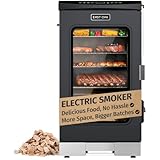Smoked foods have been a staple in many cultures for centuries. The process of smoking not only imparts a unique, rich flavor to the food but also acts as a preservative, extending the shelf life of the product. From smoked meats and cheeses to seafood, the variety of smoked foods available is vast and diverse.
The art of smoking foods is both a science and a craft. It involves slow-cooking food at a low temperature, in a controlled, smoky environment. The type of wood used in the smoking process plays a significant role in the final flavor profile of the food. Hickory, apple, cherry, and mesquite are among the popular choices, each offering a distinct taste. Mastering the art of smoking requires patience and practice, but the result is undeniably worth the effort.
One of the reasons smoked foods are great for travel is their longevity. The smoking process helps to preserve the food, making it less prone to spoilage. This makes smoked foods an excellent choice for travel, camping, or any situation where refrigeration may not be readily available. Additionally, smoked foods are generally ready-to-eat, which adds to their convenience while on the go. Whether you’re planning a road trip, a picnic, or a hiking adventure, including smoked foods in your travel menu can enhance your culinary experience.
Table of Contents
ToggleSmoked Meats
Smoked meats are a favorite among food enthusiasts and travelers alike. Their robust flavor, coupled with a long shelf-life, makes them an ideal choice for travel.
Smoked Beef Jerky is a classic travel-friendly smoked food. It’s lightweight, packed with protein, and can last for weeks without refrigeration. The smoking process gives the jerky a smoky, savory flavor that’s hard to resist.
Smoked Sausages are another excellent option. They come in a variety of flavors and can be enjoyed straight from the pack or used to add a smoky touch to sandwiches and salads.
Smoked Ham is a versatile choice that can be used in a multitude of dishes. It’s ready-to-eat and can be enjoyed as is, in sandwiches, or even diced and added to salads or pasta.
Smoked Cheese
Smoked cheese is a gourmet delight that travels well. The smoking process enhances the flavor of the cheese, adding a new dimension to its taste.
Smoked Gouda is a creamy, mild cheese with a smoky flavor that’s not too overpowering. It’s perfect for snacking or adding to sandwiches.
Smoked Cheddar is a popular choice with a distinct smoky flavor. It pairs well with fruits and crackers, making it a great picnic food.
Smoked Mozzarella is a softer cheese with a delicate smoky flavor. It’s excellent in sandwiches or melted over grilled vegetables.
Smoked Seafood
Smoked seafood is a delicacy that’s surprisingly travel-friendly. It’s packed with protein and can be a great way to add variety to your travel menu.
Smoked Salmon is a classic choice. It’s rich in Omega-3 fatty acids and can be enjoyed on its own, in sandwiches, or even in salads.
Smoked Oysters are a gourmet treat that’s high in protein and packed with flavor. They’re great for snacking or adding to pasta dishes.
Smoked Mackerel is a flavorful and nutritious option. It’s ready-to-eat and can be enjoyed as is, or used to add a smoky touch to salads or sandwiches.
For more tips on traveling with food, check out this helpful guide on Traveling with Food.
Preparing and Packing Smoked Foods for Travel
How to Smoke Foods at Home
Smoking foods at home is a rewarding process that allows you to customize the flavor of your food to your liking.
The first step is choosing the right smoker. There are various types of smokers available, including charcoal smokers, electric smokers, and pellet smokers. Each has its pros and cons, and the choice depends on your specific needs and preferences.
Next, selecting the best wood for smoking is crucial. The type of wood you use will significantly influence the flavor of your smoked food. Hickory, apple, cherry, and mesquite are popular choices, each imparting a unique flavor.
Finally, mastering smoking techniques is key to achieving the desired flavor and texture. This involves controlling the temperature, managing the smoke, and knowing the right duration for smoking different types of food.
Packing Smoked Foods for Travel
When it comes to packing smoked foods for travel, there are a few things to keep in mind.
Proper storage and packaging is essential to maintain the quality of your smoked foods. Vacuum sealing is a great way to preserve the flavor and freshness of smoked foods.
Maintaining temperature is also important, especially for smoked meats and seafood. While smoked foods are generally more resistant to spoilage, they should still be kept cool during travel to ensure food safety.
Speaking of food safety, it’s important to follow basic food safety guidelines when handling and packing smoked foods. This includes washing your hands and surfaces, avoiding cross-contamination, and ensuring the food is properly cooked or smoked.
Serving Suggestions for Smoked Foods
Smoked foods are versatile and can be enjoyed in many ways. Here are some serving suggestions:
Pairing smoked foods with the right sides can enhance their flavor. For example, smoked meats pair well with pickles and cheeses, while smoked seafood goes well with fresh lemon and dill.
Creative serving ideas can make your travel meals more exciting. Try smoked salmon on bagels for breakfast, smoked sausage in sandwiches for lunch, or smoked cheese with crackers for a snack.
FAQs
How long can smoked food last without refrigeration?
Smoked foods can last longer without refrigeration than their non-smoked counterparts due to the preservative effects of smoking. However, the exact duration depends on the type of food and the smoking process used. Generally, smoked meats and cheeses can last a few days without refrigeration, while smoked seafood should be consumed within a day. To ensure food safety, it’s best to keep smoked foods cool during travel, especially in warm weather.
What are the health benefits and risks of smoked foods?
Smoked foods offer a unique flavor and can be a source of protein and other nutrients, depending on the type of food. However, it’s important to consume them in moderation. Some studies suggest that consuming large amounts of smoked foods can increase the risk of certain health conditions due to the presence of compounds formed during the smoking process. As with all foods, balance and moderation are key.
Can you bring smoked foods on a plane?
Yes, you can generally bring smoked foods on a plane, but there are some restrictions to keep in mind. Smoked meats, cheeses, and seafood are usually allowed in both checked and carry-on luggage. However, any liquid or gel-like foods, such as sauces or marinades, must comply with the TSA’s 3-1-1 liquids rule if they’re in your carry-on. It’s always a good idea to check the specific airline’s regulations before you travel.
Conclusion
Smoked foods offer a unique, rich flavor that’s hard to replicate with other cooking methods. They’re also surprisingly travel-friendly, making them a great choice for road trips, camping adventures, or any situation where you might not have access to a refrigerator or kitchen. By choosing the right smoked foods, packing them properly, and following food safety guidelines, you can enjoy delicious, smoky flavors wherever your travels take you.







